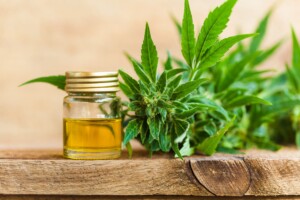FREE SAME-DAY SHIPPING ON ORDERS OVER $99.99
The 2018 Farm Bill opened new doors for farmers across the United States as it lifted the ban on one of the most highly debated agricultural commodities to date – hemp. Formerly categorized as a Schedule 1 controlled substance, the legalization of hemp has changed the way that the country sees it, and has created new opportunities for profit and progression for professionals within the agricultural sphere.
Just like the rest of the 49 other states, the State of Arizona has fully legalized the controlled and regulated cultivation, processing, and sale of hemp, paving the way for a new thriving economy to boom after decades of idleness. But there’s more to Arizona hemp law than just that.
 Aside from farming hemp, selling, buying, and using hemp flower is also legal in the Grand Canyon state. To qualify hemp as being legal or not, the law states the specific parameters that oversee the legality of a hemp sample. According to the 2018 Farm Bill, legal hemp can be described as any part of the plant Cannabis sativa L., including all of its parts and derivatives – given that the herb or its derived extract does not contain more than 0.3% delta-9 tetrahydrocannabinol.
Aside from farming hemp, selling, buying, and using hemp flower is also legal in the Grand Canyon state. To qualify hemp as being legal or not, the law states the specific parameters that oversee the legality of a hemp sample. According to the 2018 Farm Bill, legal hemp can be described as any part of the plant Cannabis sativa L., including all of its parts and derivatives – given that the herb or its derived extract does not contain more than 0.3% delta-9 tetrahydrocannabinol.
Studies have found that delta-9 THC is the compound found in the Cannabis sativa L. plant that causes hallucinogenic effects. By regulating this compound, law enforcement can be certain that the resulting hemp won’t cause the same psychoactive effects that marijuana is known for. In fact, marijuana is simply hemp that exceeds the designated THC, since both of these herbs come from the same plant.
So, for the guidance of anyone purchasing hemp in Arizona, legal hemp flower and CBD products can be identified by their THC content. Anything with THC concentrations less than 0.3% should be legal to buy, use, and possess in the Copper State.
Some of the best hemp flower Arizona has to offer can be found online through web-based retailers, but they’re not the only source. There are countless physical dispensaries that offer a range of options to avid consumers, all of which should be able to provide you the necessary documentation to prove the legality of their hemp.
On that note, finding hemp in Arizona isn’t actually the challenge. It’s finding a legal, law-abiding hemp retailer. There are lots of unscrupulous sellers out there that source their products from questionable entities. As a buyer, it’s your responsibility to perform due diligence before you engage in a transaction with any dispensary.
Any seller that complies with the law shouldn’t be afraid to provide you the necessary documentation to showcase the chemical composition of their hemp products. Sellers should also be willing to let you know where they source their hemp flower and CBD products to secure the trust of their buyers.
In Arizona, buyers and sellers are free to transact with the entire spectrum of CBD products. That includes the raw hemp flower, cigarettes, pre-rolls, cigars, oils, tinctures, topicals, capsules, tablets, teas, pet care products, skin care products, and whatever else they’re chugging out these days. All of these products – as stated by the law – are legal to use, buy, sell, and possess in the Copper State.
What you really need to be asking is not the kind of products you can buy, but whether you’re buying products that meet the law’s stipulations. According to the 2018 Farm Bill, the Cannabis sativa L. plant including all of its parts and derivatives are legal – given that they contain 0.3% delta-9 THC or less. That said, all of the hemp-derived products you find – whatever its form – should be legal as long as it has equal to or less than the indicated amount of THC.

For the most part, that’s because we don’t have the technology to tell hemp apart from marijuana. So, any law enforcement officer who sees someone smoking raw hemp in public would have no choice but to consider the substance to be marijuana until proven otherwise.
Keep in mind that marijuana is still a highly controlled substance and is illegal in Arizona for recreational use. Of course, medical marijuana is legal in Arizona, but there are strict parameters. For instance, those who are qualified to use medical marijuana should be able to present a government issued identification card to verify their use of marijuana to be legal.
All in all, being caught in public with smokable hemp flower, pre-rolls, or anything similar should be something you avoid at all costs. Presently, there is no way to differentiate the two, making it difficult for law enforcement officers to distinguish whether you’re using hemp or its illegal cousin.
That’s gonna be a no. While hemp is free to use, own, sell, buy, and possess, there’s a load of red tape guarding its cultivation. By overseeing the farming of hemp, the government can help guarantee that the herb is maintained within the appropriate parameters. Strict regulation of hemp farming helps prevent the distribution and sale of samples that exceed the THC limit, and thus keep the laws that bind the use, growth, and distribution of marijuana safeguarded.
To become a licensed hemp farmer in Arizona, you’ll have to apply for the program through the Arizona Department of Agriculture. Aside from an application and license fee, you’ll have to complete several requirements, including those that identify the plot of land you’re using to farm hemp and the floor plant of the facilities including all structures needed to grow and process the hemp.
Other than that, farmers are only allowed to purchase seed from licensed seed dealers that are acknowledged by the state. So, there’s really a lot of red tape that guards the execution of hemp farming, making it a process that isn’t just for any recreational backyard gardener.

All things said, there’s a flourishing hemp market in Arizona that’s slowly but surely climbing to its crescendo. And as buyers in this thriving market, we have the opportunity to enjoy hemp and its benefits like people once did decades ago.
For Further Reading :
[starbox id=3]